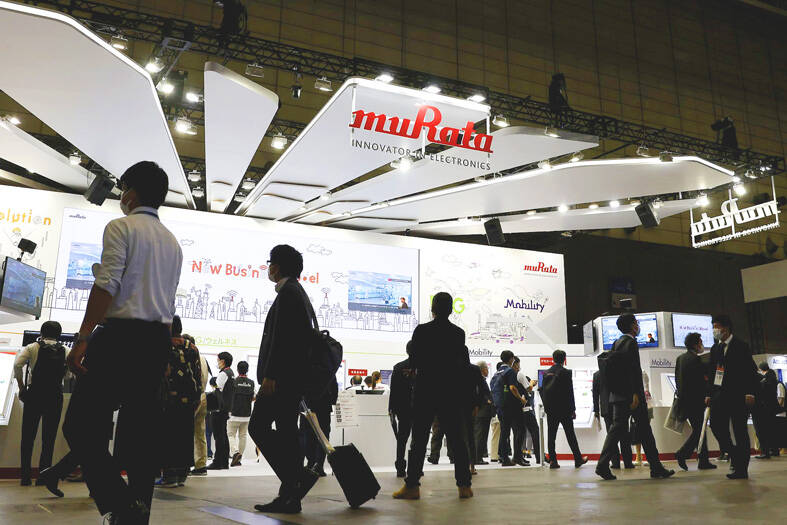Mobile industry bellwether Murata Manufacturing Co expects Apple Inc to reduce iPhone 14 production plans further in the coming months because of weak demand, which would force the supplier to again cut its outlook for its handset-component business.
“Judging by handset availability in stores, I see a downward revision happening,” Murata president Norio Nakajima said in an interview. “I hope that it won’t be too deep.”
Apple has trimmed iPhone output on softening demand and might slash production further, Bloomberg reported last month.

Photo: Bloomberg
Nakajima did not identify Apple by name — a common practice for suppliers to the infamously secretive company. Yet Apple is his key US customer and he did not deny that his references were to the iPhone giant.
Murata has already cut its global smartphone production forecast for this fiscal year a few times. The company initially anticipated in April that handset makers would produce 1.37 billion units, a slight increase from 1.36 billion in the previous fiscal year.
It lowered its prediction to fewer than 1.2 billion in October, then 1.09 billion two weeks later — both because of weaker demand for lower-end phones in China.
Nakajima said the latest estimate is 1.08 billion, a slight downward revision because of slower sales of handsets by Chinese manufacturers.
“If our forecast was to fall further, that would be because of the US customer,” he said.
The Kyoto, Japan-based manufacturer is a linchpin of the smartphone industry, providing electronic modules and components for Apple’s iPhones, Samsung Electronics Co’s Android smartphones and China’s leading device makers.
The global smartphone market is set to keep deteriorating next quarter, even as some Chinese handset makers are planning to release new models during the period, Nakajima said.
The manufacturers are confident that the new phones would sell well, but Nakajima said he has his doubts as the incoming models do not have enough enticing new features.
The phone market would start recovering “at a gradual pace” in the fiscal year starting in April, he said.
Despite the recent weakness in China, the world’s second-largest economy would remain an important market for the electronics industry, Nakajima said.
Some of Murata’s customers are shifting their production to Vietnam, India and other Asian regions, but a complete pullout from China is unlikely, at least during the next five years or so, he said.
Nakajima is running a long-term project to build a production chain for Murata that operates completely in China, using local parts. The move is aimed at addressing a potential deterioration in US-China relations — such as Beijing mandating that all products sold in the country rely on local components.
Information security is a concern, and Murata is seeking to ensure that its proprietary know-how related to manufacturing technologies is not compromised, Nakajima said.
The company might make mature products such as multilayer ceramic capacitors in China, but would not move production of some newer components to the country, he said.
Murata makes 65 percent of its products in Japan.

MULTIFACETED: A task force has analyzed possible scenarios and created responses to assist domestic industries in dealing with US tariffs, the economics minister said The Executive Yuan is tomorrow to announce countermeasures to US President Donald Trump’s planned reciprocal tariffs, although the details of the plan would not be made public until Monday next week, Minister of Economic Affairs J.W. Kuo (郭智輝) said yesterday. The Cabinet established an economic and trade task force in November last year to deal with US trade and tariff related issues, Kuo told reporters outside the legislature in Taipei. The task force has been analyzing and evaluating all kinds of scenarios to identify suitable responses and determine how best to assist domestic industries in managing the effects of Trump’s tariffs, he

TIGHT-LIPPED: UMC said it had no merger plans at the moment, after Nikkei Asia reported that the firm and GlobalFoundries were considering restarting merger talks United Microelectronics Corp (UMC, 聯電), the world’s No. 4 contract chipmaker, yesterday launched a new US$5 billion 12-inch chip factory in Singapore as part of its latest effort to diversify its manufacturing footprint amid growing geopolitical risks. The new factory, adjacent to UMC’s existing Singapore fab in the Pasir Res Wafer Fab Park, is scheduled to enter volume production next year, utilizing mature 22-nanometer and 28-nanometer process technologies, UMC said in a statement. The company plans to invest US$5 billion during the first phase of the new fab, which would have an installed capacity of 30,000 12-inch wafers per month, it said. The

Taiwan’s official purchasing managers’ index (PMI) last month rose 0.2 percentage points to 54.2, in a second consecutive month of expansion, thanks to front-loading demand intended to avoid potential US tariff hikes, the Chung-Hua Institution for Economic Research (CIER, 中華經濟研究院) said yesterday. While short-term demand appeared robust, uncertainties rose due to US President Donald Trump’s unpredictable trade policy, CIER president Lien Hsien-ming (連賢明) told a news conference in Taipei. Taiwan’s economy this year would be characterized by high-level fluctuations and the volatility would be wilder than most expect, Lien said Demand for electronics, particularly semiconductors, continues to benefit from US technology giants’ effort

‘SWASTICAR’: Tesla CEO Elon Musk’s close association with Donald Trump has prompted opponents to brand him a ‘Nazi’ and resulted in a dramatic drop in sales Demonstrators descended on Tesla Inc dealerships across the US, and in Europe and Canada on Saturday to protest company chief Elon Musk, who has amassed extraordinary power as a top adviser to US President Donald Trump. Waving signs with messages such as “Musk is stealing our money” and “Reclaim our country,” the protests largely took place peacefully following fiery episodes of vandalism on Tesla vehicles, dealerships and other facilities in recent weeks that US officials have denounced as terrorism. Hundreds rallied on Saturday outside the Tesla dealership in Manhattan. Some blasted Musk, the world’s richest man, while others demanded the shuttering of his